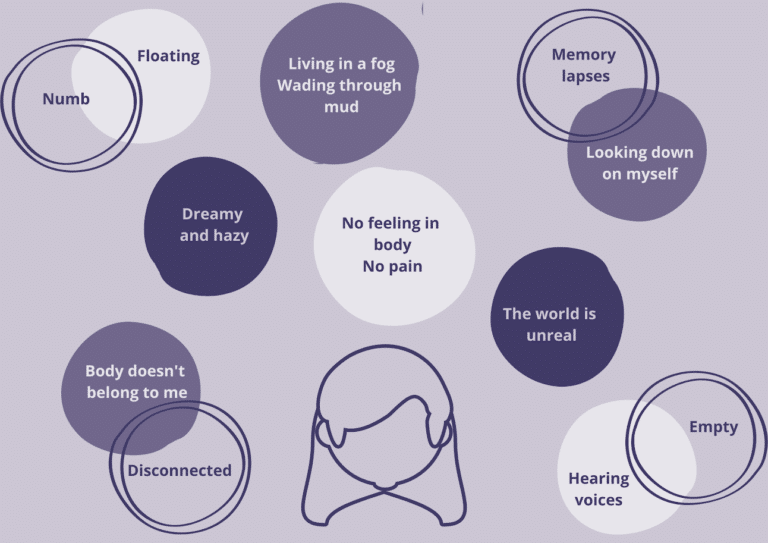Dissociation is a psychological phenomenon where a person disconnects from their thoughts, emotions, memories, or sense of identity. While dissociation can be a normal response to extreme stress or trauma, persistent or severe dissociation may indicate a dissociative disorder, a category of mental health conditions that require professional attention and treatment.
Dissociation often occurs as a coping mechanism during or after a traumatic event, providing a mental escape from overwhelming situations. While most cases resolve naturally over time, some individuals develop dissociative disorders that interfere with their daily lives. Understanding dissociation, its symptoms, causes, and treatment options can provide valuable insight into this complex mental health condition.
What is Dissociation?

Dissociation is a disconnection from reality, often described as feeling detached from oneself or the environment. For some, this manifests as a temporary response to trauma, like feeling numb or unreal during a distressing event. For others, dissociation becomes chronic and debilitating, requiring professional care.
Dissociative disorders fall into three main categories: dissociative amnesia, depersonalization-derealization disorder, and dissociative identity disorder. Each of these conditions has unique symptoms, causes, and treatment approaches.
Symptoms of Dissociative Disorders
The symptoms of dissociative disorders vary depending on the specific condition but often share common features. Individuals may experience:
- A sense of disconnection from themselves, their feelings, or their memories.
- Difficulty handling intense emotions or sudden, unexplainable mood shifts.
- Depression or anxiety, often co-occurring with dissociation.
- A feeling that the world around them is unreal or distorted, known as derealization.
- Memory lapses unrelated to physical injury or medical conditions.
- Difficulty concentrating or thinking clearly.
- Identity confusion, such as behaving in ways that feel out of character.
These symptoms can disrupt daily life and relationships, often requiring therapeutic intervention to manage effectively.
Types of Dissociative Disorders
Dissociative disorders are classified into three primary types:
Dissociative Amnesia
This condition involves memory loss related to traumatic or stressful events. Unlike typical forgetfulness, individuals with dissociative amnesia are aware of their memory gaps but cannot recall specific events or details.
Subtypes of dissociative amnesia include:
- Localized amnesia: Complete memory loss of a traumatic event.
- Selective amnesia: Patchy or incomplete memories of an event.
- Generalized amnesia: Difficulty recalling personal information from one’s entire life.
- Systematized amnesia: Memory loss specific to certain categories, such as details about a particular person.
Depersonalization-Derealization Disorder
This disorder involves a sense of detachment from oneself (depersonalization) or the environment (derealization). Individuals often describe feeling like they are observing their own life from a distance, as if watching a movie.
Symptoms include:
- Feeling emotionally disconnected or “spacey.”
- Experiencing time as slowed or distorted.
- Perceiving one’s body as altered in size or shape.
- Difficulty recognizing oneself in a mirror.
Dissociative Identity Disorder (DID)
Previously known as multiple personality disorder, DID is characterized by the presence of two or more distinct personality states. Each personality may have unique behaviors, voices, and memories. Often, individuals with DID are unaware of these alternate states and experience significant memory lapses.
DID is typically associated with severe childhood trauma and is considered the most controversial and severe dissociative disorder.
Causes of Dissociative Disorders
The exact cause of dissociative disorders is not fully understood, but most experts agree that chronic trauma during childhood is a significant factor. Traumatic experiences such as repeated physical or sexual abuse, neglect, or an unpredictable home environment can lead to dissociation as a coping mechanism.
In adulthood, extreme stressors such as war, natural disasters, or torture may also trigger dissociative disorders, particularly in individuals with a history of trauma. The severity of dissociation in adulthood often correlates with the intensity and duration of early-life trauma.
Complications of Untreated Dissociation
Without treatment, dissociative disorders can lead to numerous complications, including:
- Difficulties maintaining relationships or employment.
- Sleep disturbances, including insomnia.
- Sexual dysfunction or a lack of interest in intimacy.
- Co-occurring conditions such as severe depression, anxiety, or eating disorders.
- Substance abuse, including alcohol or drugs, as a way to self-medicate.
- Increased risk of self-harm or suicide.
Recognizing the signs of dissociative disorders and seeking early treatment can help prevent these complications and improve long-term outcomes.
Diagnosis of Dissociative Disorders
Diagnosing dissociative disorders is a complex process that requires careful evaluation by a mental health professional. These conditions often overlap with other mental health issues, such as obsessive-compulsive disorder, post-traumatic stress disorder (PTSD), or anxiety, making diagnosis challenging.
A thorough diagnostic process typically includes:
- Medical evaluation to rule out physical causes, such as head injuries or neurological disorders.
- Psychological assessment to identify specific dissociative symptoms.
- Detailed interviews with the individual and, in some cases, their family members.
Differentiating dissociative disorders from conditions caused by substance use or medication side effects is also crucial in ensuring accurate diagnosis and appropriate treatment.
Treatment for Dissociative Disorders
Treatment for dissociative disorders varies based on the type and severity of the condition. Generally, treatment focuses on addressing underlying trauma, improving coping mechanisms, and managing symptoms.
Psychotherapy
Psychotherapy, or “talk therapy,” is the cornerstone of treatment for dissociative disorders. Techniques include:
- Cognitive-behavioral therapy (CBT) to address negative thought patterns and behaviors.
- Trauma-focused therapy to process and heal from past traumas.
- Psychoanalysis to explore unconscious memories and experiences.
Medication
While no medications specifically target dissociative disorders, certain drugs may be prescribed to manage co-occurring conditions, such as:
- Antidepressants for depression or anxiety.
- Anti-anxiety medications for severe stress or panic.
- Antipsychotics for symptoms of psychosis or severe emotional distress.
Creating a Safe Environment
Recovery from dissociation requires a supportive and relaxed environment. Building a sense of safety helps individuals feel secure enough to address underlying trauma and work through emotional challenges.
Tips for Managing Dissociation
- Practice Grounding Techniques: Activities like deep breathing, mindfulness, or focusing on physical sensations can help reconnect with the present moment.
- Establish a Routine: Consistent daily habits provide structure and stability.
- Seek Support: Talking with trusted friends, family, or a therapist can reduce feelings of isolation.
- Limit Stress: Avoid overwhelming situations and practice stress-reduction strategies, such as yoga or meditation.
- Stay Physically Active: Regular exercise promotes overall mental health and reduces tension.
Authentic US Sources for Information
- National Alliance on Mental Illness (NAMI): www.nami.org
- MentalHealth.gov: www.mentalhealth.gov
- Trauma-Informed Care Implementation Resource Center: www.traumainformedcare.chcs.org
- American Psychiatric Association: www.psychiatry.org
- International Society for the Study of Trauma and Dissociation (ISSTD): www.isst-d.org
Conclusion
Dissociation is a complex condition that can be both a natural response to trauma and a sign of a deeper mental health issue. Recognizing the symptoms and seeking timely diagnosis and treatment are crucial steps toward recovery.
Through therapy, medication, and self-care practices, individuals with dissociative disorders can regain control of their lives and improve their overall well-being. If you or someone you know may be experiencing dissociation, don’t hesitate to reach out to a mental health professional for help.


